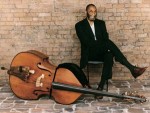Title
On February 20, Juilliard presented a master class by legendary bassist Ron Carter, one of the greatest living practitioners of the jazz art form. Equal parts intellectual genius and pedagogical master, Carter shared with students his attention to detail and reflected upon the intricacies of a jazz bassist’s role in an ensemble.
Body
Carter, a revolutionary on his instrument, has a voluminous biography that traces some of the most important developments in jazz music since the beginning of the 1960s. Well known for his work in the groundbreaking second incarnation of the Miles Davis Quintet of the mid-’60s, Ron Carter has also made historic recordings with the likes of Eric Dolphy, Herbie Hancock, Dexter Gordon, and Joe Henderson. A conservatory-trained bassist and cellist, he has won Grammy awards both for his jazz albums and film scores and, at 70, continues to represent the highest level of creativity and musicianship.
“He’s one my biggest influences,” said Philip Kuehn, a fourth-year bassist. “It’s really an honor to have him here and share his thoughts, both on bass lines and on musicianship in general.”
A hallmark of most jazz performances is the improvised accompaniment of the rhythm section. Much like a harpsichordist in a Baroque basso continuo, the bassist, pianist, and guitarist are charged with the task of spontaneously creating musical textures based on a prescribed set of chords. Most styles of jazz allow considerable freedom for the musicians to insert pedal points, imply inversions, and even instantaneously compose new harmony behind the soloist.
The class cast a spotlight upon the often enigmatic role of a bass player, and explored the finer points of improvised bass lines. Carter is renowned, in particular, for his keen accompaniment ability and his fluid, highly sophisticated sense of harmony. With the students, he talked about taking advantage of the creative freedom while also best serving the musical goals of the group.
“Whenever I play, I think about what note will make the other musicians’ notes sound the best,” he explained. “I’m always listening, and at each moment I want to pick a note that will make the other musicians think. I want to push the music to a higher level.”
As in great composition of any style, Carter’s bass lines demonstrate not just complexity but also efficiency; they are rooted in his ability to squeeze creative mileage out of a limited number of notes. As an exercise, he asked students to construct bass lines on a 12-bar blues form while keeping the left hand in first position and using only chord tones—the root, third, or fifth—of each harmonic change.
“There are so many possibilities,” he said. “There are so many lines you can create just with those notes. After you’ve explored those, you can start to add more notes and gradually make the lines more complex.”
Underlying his conceptual approach to improvisation, however, is a strict commitment to fundamental pedagogy of the instrument. During the first hour of the class, Carter gave an open lesson to Juilliard bassist Ben Williams, addressing technical issues of the bass in a one-on-one setting. He began Williams with an F-major etude from Book One of Fraz Simandl's New Method for the Double Bass, which served as a vehicle for lessons in intonation and sound control.
“His attention to detail is remarkable,” commented Williams, a master’s student in the Jazz Studies program. “It’s a real privilege to be able to work with him individually.”
Said second-year pianist Kris Bowers: “He shows how much we can all gain from complete mastery of our instrument.”
Following his work with Williams, Carter picked up the bass and ripped through nearly a dozen choruses of bass lines on the changes of Gershwin’s “I Got Rhythm,” an impromptu tour de force of harmonic and rhythmic displacements.
“When he plays, it’s clear how important the technical fundamentals are to what he plays,” said Ryan Hayden, a master’s student studying drums. “Everything he said to Ben was completely reflected in his playing.”
“His lines are incredible,” said first-year saxophonist Eddie Barbash. “There’s no one else who can do what he does.”
As is typical with jazz master classes, the question-and-answer portion of the session explored a wide range of subjects. At one point, fourth-year pianist Jonathan Batiste asked what advice Carter would give to a young jazz musician. The response: grab a book and read a piece of fiction.
“I would want you to tell me about all the characters. I would want you to tell me how the author develops the plot, how he foreshadows the events, and how he takes the reader on a journey,” Carter said. “Music is storytelling. But first, you have to learn how to tell a good story.”
“As musicians, we take so much for granted,” noted Carl Allen, artistic director of Jazz Studies. “Mr. Carter demonstrated the importance to all musicians of continuing to build one’s skill set.”
He left the students on an uplifting note, explaining the joys and challenges he continues to encounter. “I’ve been playing this instrument for over 50 years,” he said. “Every day I’m still finding new combinations of notes to play, and wondering and wondering why I didn’t think of that before.”





